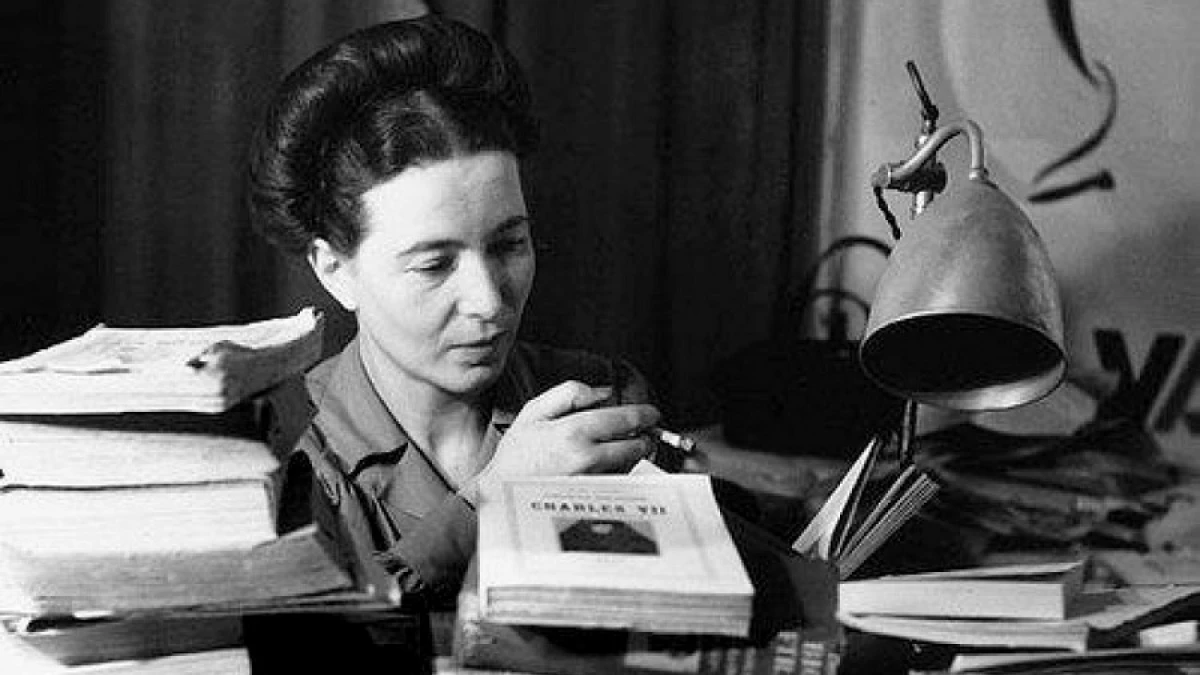(Paris, 1908-1986) French thinker and novelist, representative of the atheist existentialist movement and an important figure in the vindication of women's rights. Originally from a bourgeois family, she stood out from an early age as a brilliant student. She studied at the Sorbonne and in 1929 she met Jean-Paul Sartre, who became her companion for the rest of her life.
He graduated in philosophy and until 1943 he devoted himself to teaching at the lycées of Marseilles, Rouen and Paris. His first work was the novel The Guest (1943), followed by The Blood of Others (1944) and the essay Pyrrhus and Cineas (1944). She participated intensely in the ideological debates of the time, harshly attacked the French right wing and assumed the role of a committed intellectual. In her literary texts she revised the concepts of history and character and incorporated, from an existentialist point of view, the themes of "freedom", "situation" and "commitment".
Together with Sartre, Albert Camus and Maurice Merleau-Ponty, among others, she founded the magazine Tiempos Modernos, whose first issue was published on October 15, 1945 and became a political and cultural reference of French thought in the mid-twentieth century. Subsequently, he published the novel All Men Are Mortal (1946), and the essays For a Morality of Ambiguity (1947) and America a Day (1948).
Her book The Second Sex (1949) was a theoretical starting point for various feminist groups, and became a classic work of contemporary thought. In it she elaborated a history of the social condition of women and analyzed the different characteristics of male oppression. She asserted that by being excluded from the processes of production and confined to the home and reproductive functions, women lost all social ties and with them the possibility of being free. She analyzed the gender situation from the point of view of biology, psychoanalysis and Marxism; she destroyed feminine myths, and urged the search for authentic liberation. She argued that the struggle for the emancipation of women was distinct from and parallel to the class struggle, and that the main problem to be faced by the "weaker sex" was not ideological but economic.
Simone de Beauvoir founded with some feminists the League of Women's Rights, which set out to react firmly to any sexist discrimination, and prepared a special issue of Modern Times devoted to the discussion of the subject. She won the Prix Goncourt with The Mandarins (1954), in which she dealt with the difficulties of post-war intellectuals in assuming their social responsibility. In 1966 she participated in the Russell Tribunal, in May 1968 she showed solidarity with the students led by Daniel Cohn-Bendit, in 1972 she presided over the Choisir association, in charge of defending free contraception, and until her last days she was a tireless fighter for human rights.
Her abundant testimonial and autobiographical titles include Memoirs of a Formal Young Woman (1958), The Fullness of Life (1960), The Force of Things (1963), A Very Sweet Death (1964), Old Age (1968), The End of Accounts (1972) and The Farewell Ceremony (1981).
Megathreads and spaces to hang out:
- ❤️ Come listen to music and Watch movies with your fellow Hexbears nerd, in Cy.tube
- 💖 Come talk in the New Weekly Queer thread
- 💛 Read and talk about a current topics in the News Megathread
 Come talk in the New Weekly PoC thread
Come talk in the New Weekly PoC thread- ⭐️ September Movie Nominations ⭐️
reminders:
- 💚 You nerds can join specific comms to see posts about all sorts of topics
- 💙 Hexbear’s algorithm prioritizes comments over upbears
- 💜 Sorting by new you nerd
- 🌈 If you ever want to make your own megathread, you can reserve a spot here nerd
- 🐶 Join the unofficial Hexbear-adjacent Mastodon instance toots.matapacos.dog
Links To Resources (Aid and Theory):
Aid:
Theory:

Why is it such a pain to find glasses stores that are in network for my insurance? I'm switching companies after I use up my benefits this year, this sucks.
The monopoly on glasses frames and lenses is also absolutely insane, btw. No real country would allow it.
Luxottica and it shell companies have something in the range of 80 to 90 percent market share globally or something insane iirc
I might fuck around and just skip vision insurance and pay out of pocket for indie frames and lenses and exams. There's a shop in my city that doesn't carry Luxottica and has their own lens lab.
There's places in most US cities that'll do deals like two-for-one frames with free exam for under $100 fwiw. Also if you can find your prescription there's online-only frame retailers that can be pretty cheap.
Ask your eye doctor to give you your prescription, and make sure they note down your pupil distance. I think they're required to do it, but I'm not sure.
it's unreal, they own most of the brands and most retail locations for glasses. and so overpriced for the quality. i bought Shuron frames mainly out of spite, they seem a lot better-made too
idk, but it's ridiculous and utterly shit. Paying 150$ for a piece of molded plastic that cost at most a few dollars to make? Absurd. rn I'm trying to find frames that won't give me a headache bc my face is a weird shape. medicaid here covers an annual eye exam but not glasses bc lol fuck you I guess. Trying to decide if I want to get lenses made one place and slap them in to the xxl frames I can only seem to find online.
Related, I cannot believe that there hasn't been any innovation on glasses in like a century. There has to be some better way to attach these damn things to my face than arms over my ears that pinch my temples.